Defender's Quest II: The City of Ennekar
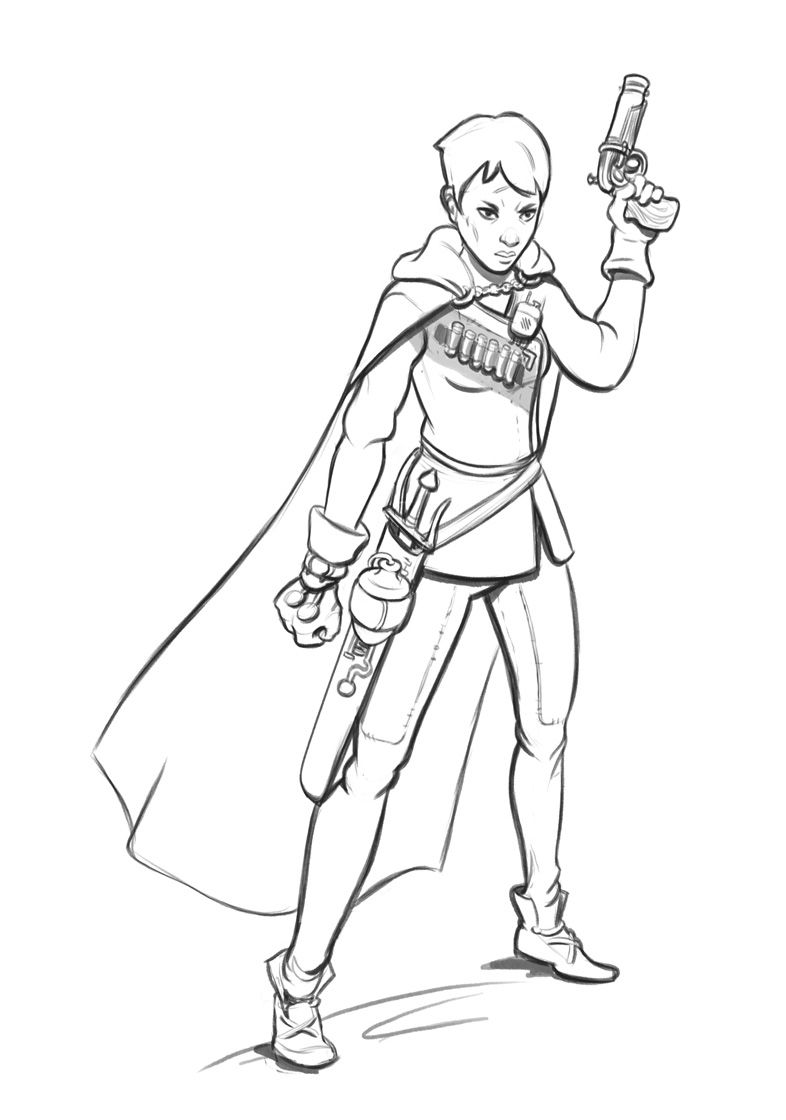
LARS: As the Defender's Quest II engine and Defender's Quest HD get further along towards completion, we've been building up a huge internal backlog of story and art materials as our writer, James, keeps churning on. He's currently up to his fifth draft of the DQII story and we figured it was high time we shared some with you all! We'll try to keep these at a steady drip from now on.
NOTE: James has been recovering from a nerve injury, so please excuse any 'exuberance' attributable to the effect of medications.
James the writer here, and I just want to say oh my goodness you guys, I am so super pumped for everything about this project! ...Although that might just be all the prescription painkillers I'm currently hopped up on. Bam! Pow! Pharmaceuticals developed for the treatment of crippling nerve pain! Zap! Other Batman sound effects!
Anyways, I was just so over-brimming with enthusiasm that I thought I would share some of it with you guys. So, here's a snapshot of what's going on deep inside the creation process behind Defender's Quest 2! Well, not a literal snapshot, because I'm currently wearing nothing but Corona pattern boxers and a comically oversized purple floral print bathrobe my grandmother gave me for Christmas last year. A snapshot with words! And some concept art! And music! And dancing! (Although that might just be me.)
So today we're going to be talking about the Ennekar Empire (pronounced "enn – uh – car"), which is going to be one of the major factions players will interact with throughout Mists of Ruin.
(Cue super kick ass music by Kevin Penkin, which I recommend playing in a continuous loop while gesturing wildly with a spatula you're pretending is a sword and shouting "This is the Empire! Kneel while you still have legs!" at pets and passersby… at least that's what I'm doing anyways.)
(Here's a direct link in case you can't see the audio player)
How Ennekar Became The Bee's Knees (and then some)
The City of Ennekar is the big cheese of the known world, where "cheese" means "our feudal overlords who will stomp the snot out of us if we don't continue sending them tribute and doing all their dirty work for them."
See, just about 97% of the known world is covered in a toxic, heavier-than-air gas colloquially referred to as "mirk." Now, unless you are one of the lucky bastards that live up on the mountain tops that jut above this stuff, or one of the giant albino miners living in carefully-sealed subterranean complexes, your life is entirely dependent on technology. Cities in the mirk, like Ennekar and its neighbors, use massive amounts of technology and power to project domed energy shields to keep the mirk out.

Judging by the massive complex of ruins that sprawls across the surface, this technology used to be common. However, by the time Mists of Ruin takes place, humanity has receded from a grand, planet-spanning civilization to scattered city states living in still functional pockets amongst the ruins of their previous grandeur. Unfortunately, technology wears out, and Domed Cities no longer possess the infrastructure or knowledge to create replacement parts. Scavengers are constantly combing the wastelands outside their city walls for salvage, just to keep the city alive a little bit longer.
Since expansion is entirely out of the question (good luck developing that just-outside-of-town suburb without a breathable atmosphere), overpopulation is rampant. Cities have to resort to brutal population culling just to keep things at a supportable level.

Well, cities that aren't Ennekar, that is. So long ago that nobody can remember anything different, Ennekar discovered something interesting directly below its streets. Remember those giant albino miner guys?

As it turned out, there happened to be a whole city of them right underneath Ennekar!
While initial contact was a little bit scary (thanks to the incredibly tight resources, malnourished Domed City dwellers don't normally get much above 5 feet tall, while the well-fed miners can sometimes hit 7+), diplomatic communication revealed some interesting opportunities. The miners actually suffer from the exact opposite problem as Domed Cities: they have all the space they could possibly want to expand (as long as they do their mining carefully and don't burst into a pocket of mirk), but the incredibly dangerous work means that miners drop like flies – the great struggle of their society is just keeping the birth rate higher than the mortality rate.
Well, this situation seemed like it had a pretty obvious solution: instead of the whole nasty business of euthanasia, Ennekar could trade their surplus population to the miners. In exchange, the miners brought them all sorts of resources that were plentiful underground, but incredibly scarce on the surface. Suddenly Ennekar had an ample supply of metals, food, even technology. With plentiful resources and the ability to turn its surplus population into productive workers, Ennekar quickly outstripped neighboring Domed Cities.
It wasn't long before Ennekar had successfully giblet-stomped everyone else into subservience. Ennekar's neighbors came under treaties of vassalage, sending regular tribute of resources and technology in exchange for military protection and/or not getting the snot beat out of them, depending on how benevolent the current Emperor was. This positive feedback loop rocketed Ennekar into the position of the world's leading superpower.
Frictions built up between Ennekar and the Under City, but by now Ennekar was far too powerful for the Under City to renege on their treaty. The miners found that their mutually beneficial relationship had helped their partner so much that it was now strong enough to turn the treaty into a parasitic relationship: the Under City was used as a dumping ground for excess population, resources were extracted at an unfair level, and miners were often used as expendable cannon fodder in Ennekar's many wars of conquest. (Not to mention all of the problems inherent with a massive influx of foreign population – ethnic rivalries between full-blooded miners, mixed ancestry populations, and freshly exiled Ennekar nationals led to violent fragmentation in the Under City.)
The problem with being the wealthiest and most powerful nation in the known world is that it has an unfortunate tendency to make you fat, lazy, and decadent. After centuries of being the world's one superpower, Ennekar grew increasingly corrupt. The educated elite (a specialist class dedicated to managing the ancient technology needed to keep the city alive, and requiring a lifetime's worth of training) began to act with increasing disregard for the good of the Empire as a whole, accumulating personal wealth and power even if it meant undermining the integrity of Ennekar. As the situation grew more and more extreme, Ennekar's position in the world began to be jeopardized; there's a limit to how much you can weaken the state to fill your own coffers before all those vassals you've abused for centuries start to smell blood in the water.
Just when it seemed that the Empire couldn't possibly hold itself together any longer, a charismatic and honest military general overthrew the corrupt regime in a violent coup, proclaimed himself Emperor, and launched a series of brutal and far-reaching reforms. As the dust settled, three major powers emerged on Ennekar's political scene:
Dagulbanda the Hand of Judgment, Lord of Ennekar, Lord of the Earth

The blood of the decadent will wash the corruption from our streets – Ennekar will be purified, and its glory reborn.
A charismatic military officer of mixed Ennekar and Under City ethnicity, Dagulbanda ("dah – ghoul – bahn – dah") spent 20 years rising through the ranks of Ennekar's army, widely acclaimed for his ability to unify Ennekar nationals and Under City miners under his command. The higher he rose, the more frustrated he became at the state of the city: each step just let him see more of the rampant corruption that was threatening to destroy the Empire but still didn't give him any ability to stop it. Even as a lauded general, the corruption ran too deep and the parties who benefited were too powerful for Dagulbanda to do anything. All he could do was sit by and watch as these smiling jackals ate the heart of the Empire.
The ruling regime's impossible decadence and corruption finally erupted into violent social upheaval. On the surface, shortsighted systems designed with more interest in increasing the wealth of their creators than maintaining order collapsed. A plethora of different factions sprung up: mixed ancestry miners, full-blooded miners, and fresh exiles fought against the surface and each other, while the official armies of the surface (which had always recruited heavily from the miners below) broke down – loyalist forces, surface dwelling miners, and even the trampled working-class rose up under their own leaders, not to mention every two bit general with an ounce of ambition. The city was poised to destroy itself. In the midst of the chaos,
Dagulbanda saw his ultimate opportunity to effect a change. And by "effect," I mean "restore order by brutally crushing the rival factions that were spreading sectarian violence throughout the city," and by "a change," I mean "and then storm the Palace, overthrow the government, and beat the decadent and useless Emperor to death on his own throne before being proclaimed champion of the people and Lord of Ennekar by an exultant populace."
Having killed his predecessor with his bare hands, the new Emperor launched a campaign of a ruthless restructuring. Dagulbanda was far more than just an opportunist – decades of decadence had set Ennekar on a collision course with its own destruction, and he felt he had been uniquely placed to save it. Overthrowing the current regime was just the first step. If he was going to successfully return Ennekar to its former glory, he was going to have to eliminate the corruption that had spent generations worming its way into every level of society. Utilizing his massive popularity with the lower classes, he set about stripping the previously powerful of their wealth and privileges and in extreme instances their lives. The city required an educated elite in order to run, so class extermination was not an option. Instead, Dagulbanda had to detect the most egregious instances of corruption and excise them with surgical precision while leaving the city strong and functional. All the existing channels for addressing corruption (police organizations, courts, etc.) had been fully corrupted themselves, so the new Emperor created the Overseers:
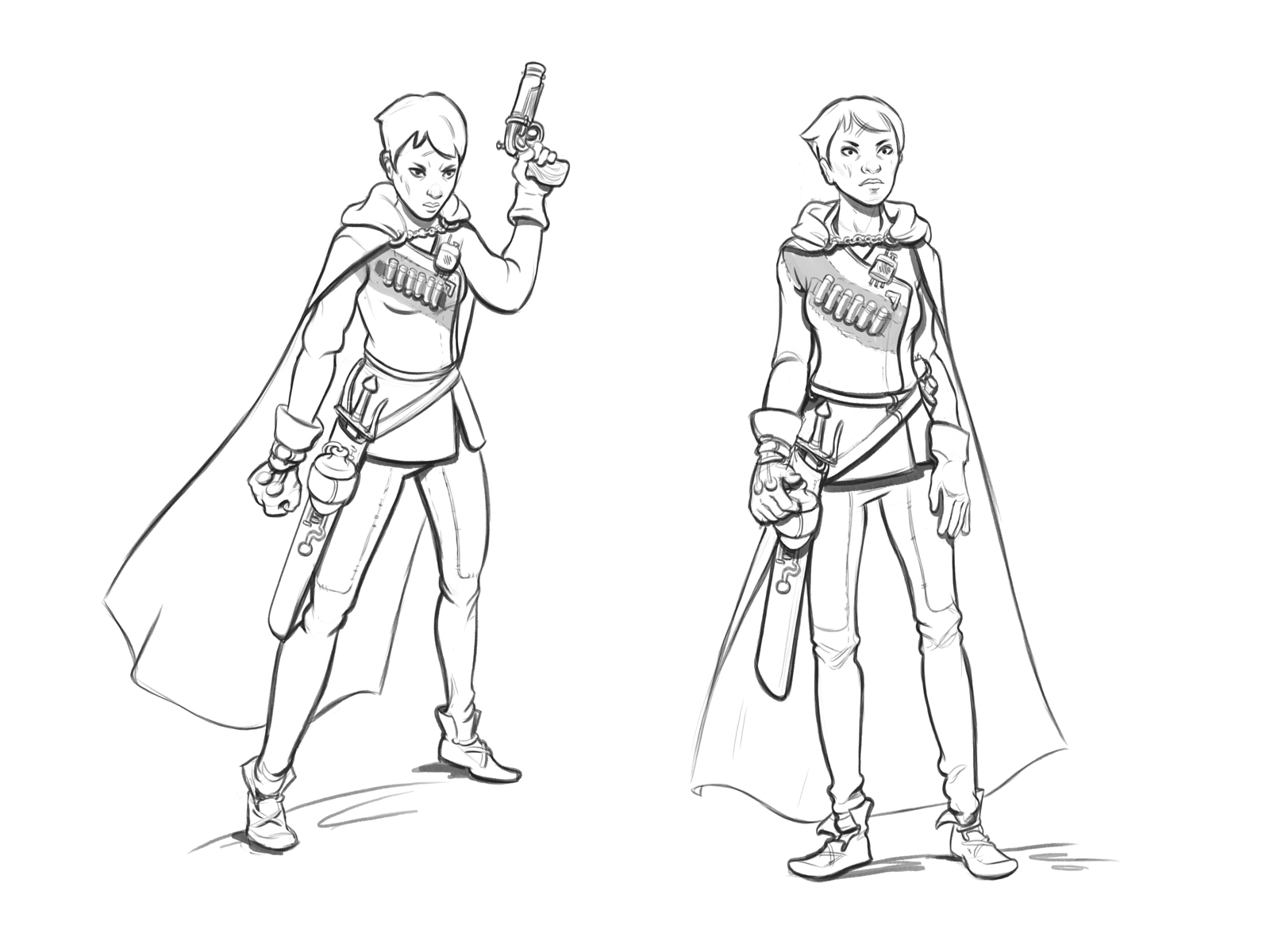
There is no darkness that can hide your corruption.
Answering only to Dagulbanda and invested with the right to search and seize anything anytime anywhere, the Overseers are like an army of auditors crossed with Eliot Ness crossed with Batman. All overseers are hand selected by the Emperor after extensive research to ensure is that each agent is incorruptible. After selection, each individual is subject to rigorous training and education. The end result is an elite anticorruption task force something like The Untouchables with a dash of the Spanish Inquisition and a slight vigilante justice vibe.
When an instance of intolerable corruption is discovered, the punishment is thorough and brutal. The idea here is twofold: firstly, to send a message to the victims of corruption that justice will be served (and reinforce Dagulbanda's image as a champion of the people) and secondly, to serve as such a grim warning that other people guilty of corruption will abandon their ways (thus avoiding the need to kill off too many members of the Engineering class that the city depends on to run). In the perfect society that Emperor Dagulbanda imagines, every citizen (including himself) will only act for the betterment of the city. Overseers believe themselves to be the harbingers of this perfect society. As the motto of the Overseers states, "The battle against corruption begins within yourself."
The events of Mists of Ruin find the Emperor 10 years into Dagulbanda's grand restructuring. His reforms and the Overseers have managed to stop much of the damage being caused by the previous regimes' selfishness and ineptitude, but the Empire's power has been permanently affected. Many of its stronger vassal states have sensed this weakness, and look for any opportunity to strike. No one is more aware of this than Dagulbanda, and he fears that he will soon have to make some great display of power to keep Ennekar's subordinates in check.
Empress Glory-Tribute, Queen of the Under City
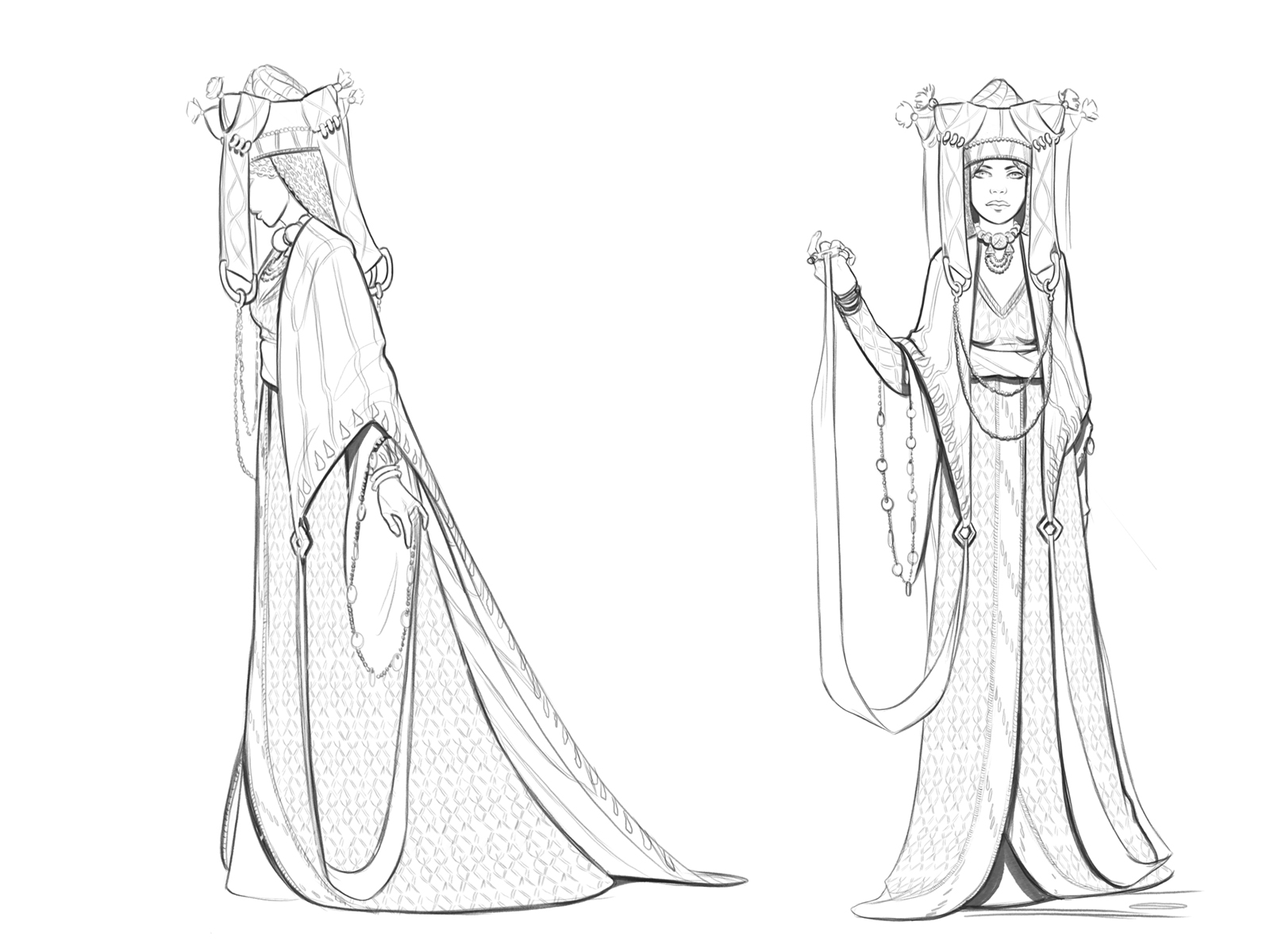
Ideals are fine for the idealist, but for those of us who live in the real world… Sometimes you have to slit a few throats to make a throat omelette.
Glory-Tribute is the full-blooded miner Queen of the Under City, and officially Dagulbanda's wife and coruler. While Ennekar has a fairly simple political structure, with an Emperor and a ruling family, the miners’ social order is radically different. The desperate struggle to keep up population means that men are largely used as the "expendable gender" – mining, building, and doing all the other things that lead to an average life expectancy of 35. This "protect the baby makers" mentality meant that women and men began developing radically different social roles, with women (who lived on average twice or more a man's expected lifespan) taking over all of the social duties that are best done by people who aren't dropping like flies, such as planning, ruling, directing strategy, etc. The gender roles quickly became strong burly men punching monsters in the face, and elegant intelligent women running the government, etc. Women are trained by birth to do things only educated people can do while male miners are largely illiterate, (because time spent learning these things could be better spent fighting and building and growing ridiculous mustaches.)
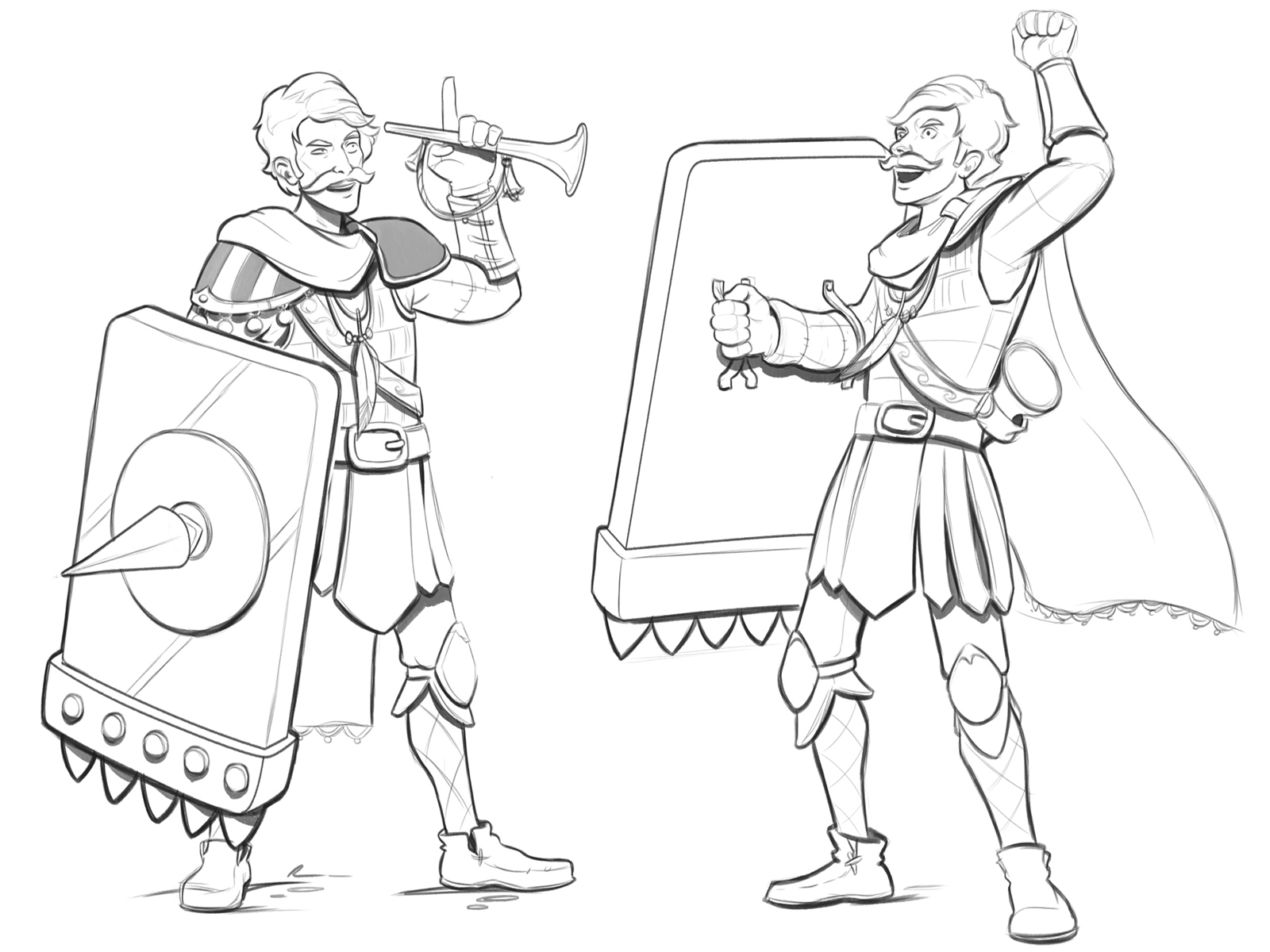
Anyways, while the male miner's have their own social structure with a King at the top, the King is a front lines leader who is basically chosen for being the best at "being a man": combat prowess, strength, etc. (The election/selection process usually involves some massive brawl where contenders beat the snot out of each other until the best man is left standing.) The entirely separate female social structure has a Queen (elected by a council within the government) at the top who actually rules the kingdom, making the big picture decisions that are best made by a wise, educated person who isn't going to get killed off tomorrow. Since each one is being selected in a separate process and gets changed out at different rates at different times, the king and queen of miner kingdoms are almost never married to one another.
When Ennekar and the Under City first came into contact, this matriarchal structure seemed to dovetail perfectly with the power structure of Ennekar: the Over City had an Emperor, the Under City had Queen – a marriage alliance could cement the symbiotic relationship between the two kingdoms.
Of course things didn't work out that simply. As Ennekar grew more decadent (and its relationship with the Under City became more parasitic than symbiotic), the miner Queen became less a legitimate coruler and increasingly a symbol of the Under City's complete subjugation – as time progressed, Emperors didn't even bother to marry the Queen anymore, instead keeping her around as an "Imperial Consort," a glorified concubine whose purpose was to advertise to the world Ennekar's wealth and power. "Our Emperor is so powerful he keeps Queens as his playthings."
Well, the problem with writing someone like the Consort off as nothing more than "professional arm candy" (as many of Ennekar's ruling elites did) is that, if that "professional arm candy" turns out to actually be a hyper competent behind the scenes mover with her own political agenda and a long history of grievances against her people, she's perfectly situated to, say, establish a massive ring of spies and assassins right in the heart of the Empire before you even have time to stop and say "does my tea taste a little bit like strychnine?" (as many of Ennekar's ruling elites did [just before they went "does my ability to breathe erkblargh?"]).
Glory-Tribute's sudden rise to power caught most of Ennekar's decadent powers-that-be completely offguard; the Consort was supposed to be some clueless trophy "elected" by the Under City to sit next to the Emperor and look pretty and nod at official functions, not some shadowy cloak and dagger spymaster with a ruthless dedication to the interests of her people and a knack for arranging unfortunate accidents amongst the aristocracy. By the time anyone realized she was threat, it was already too late. It was actually Glory-Tribute's support that made Dagulbanda's overthrow of the government possible.
Despite being instrumental in his victory, Glory-Tribute and Dagulbanda share only a tenuous peace. As the dust settled in the wake of Dagulbanda's ascension to power, he and Glory-Tribute struggled to figure out exactly how this new power dynamic worked. Glory-Tribute had transformed herself overnight into the female leader that the Under City had always wanted. On the surface, Dagulbanda was a bridge that united reformers from a host of different factions that would otherwise be at each other's throats. As far as the majority of the populace was concerned, Dagulbanda and Glory-Tribute were the perfect heroes of the of the new regime that would reclaim the glory of the past. The Emperor and Queen would be married in a perfect union that would unite the two cities and make everything as right as it once was!
Outside of public opinion, the situation was a lot more strained. Dagulbanda had plans to destroy entirely the corrupt system and replace it with a rule of law that would guarantee the self-destructive excess of the past would never happen again. To this end, Glory-Tribute was a relic of the corruption of the past regime – a political mover in the shadows, risen to power through rigged elections and all of the underhanded exploitations that Dagulbanda hoped to eliminate. While her goals may have been noble, her language was still the language of corruption. The ideal situation for Dagulbanda would be the appointing of a new Queen, through a legitimate election, reinforcing the rule of law he hoped to establish. If he was going to build a new society, it needed to start off on the right footing.
As far as Glory-Tribute was concerned, Dagulbanda was a dangerously unknown variable. The ideal situation for her would be to fill the power vacuum with a simple puppet King that would allow her to pursue her own agenda unopposed. Dagulbanda's plans for massive government reform had the potential, as Glory-Tribute saw it, of unleashing even more chaos than they sought to avert. The revolution had broken down the strongest barriers to her achieving her goals, but now she worried that Dagulbanda would completely destroy the system that allowed her to work. His reforms were nobly motivated, and looked fantastic on paper, but Glory-Tribute had spent too long as a political power to believe that reality would work out so cleanly.
Unfortunately, neither one of them could afford to get rid of the other. Glory-Tribute rightly recognized Dagulbanda as one of the only figures that could unite the highly fractured surface society. Ennekar as a whole would never tolerate being governed directly by a miner Queen, and any attempt to replace him would risk a sectarian war of succession. On Dagulbanda's side, deposing Glory-Tribute was out of the question if he wished to maintain the loyalty of the Under City – as far as they were concerned, she was their champion. While he was respected for his miner upbringing and values, he was still only a man (and of mixed ancestry at that) – Dagulbanda might be fantastic at being a man (and his heroic feats of strength and bravery in the revolution earned him great points amongst the male miners), but as far as miners were concerned, the true rulers were women; Dagulbanda might be great at punching things in the face with extreme prejudice (as was expected and celebrated), but he needed the wisdom and experience of a woman to decide the big picture stuff. The two were at a stalemate: each one needed the other in order to guarantee the unification of the two cities.
They've been playing this uneasy game for around 10 years now, and the relationship between the two is starting to get weird. Nothing has changed in regards to trusting one another, but a decade of working together has put a veneer of friendship over the underlying problem. As it turns out, Dagulbanda's reforms haven’t brought the world crashing down around them as Glory-Tribute feared, and Glory-Tribute's willingness and ability to operate outside of the rules has actually caught some areas of corruption that Dagulbanda's more meticulous investigations would have allowed time to hide. Dagulbanda would hate to admit it, but Glory-Tribute's illegal cloak and dagger activities have helped his attempts at reform significantly.
General Ularishtim, Lord Marshal of the Armies of Ennekar
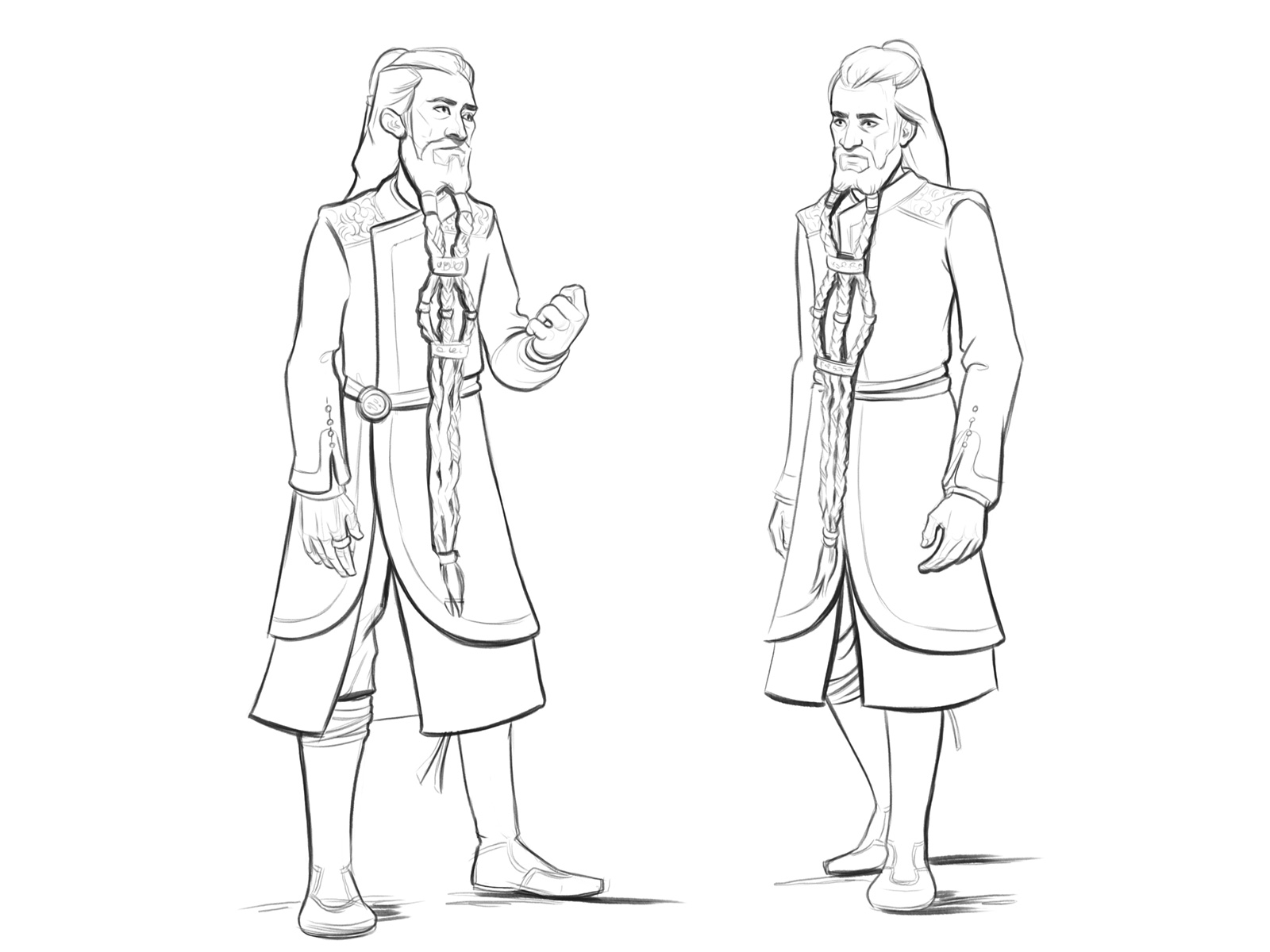
Even emperors should remember that everything exists for a reason.
While the ruling class of Ennekar was known for its incredible decadence before Emperor Dagulbanda took control, it still contained many individuals, like General Ularishtim ("ooh – luh – reesh – team"), who were not corrupt or undermining the integrity of the Empire for their own personal gain. Ularishtim's position has been one of incredible frustration: prior to the current regime, he seemed to be one of the only "good cops" in an entirely corrupt city. No matter what, the system continued to degrade. But when change finally did come in the form of Emperor Dagulbanda's coup (which probably wouldn't have succeeded without Ularishtim’s support), the system that Ularishtim hoped to save was smashed to pieces and thrown out wholesale. It's a little bit like being a Catholic reformer just as the Protestant Reformation kicks in – you wanted to fix things, but you wanted to fix them from the inside, while preserving everything that you felt was still important.
Ularishtim's lack of corruption and generally high level of competency at his job (plus his initial support for the coup in its early days) have saved him from the purges of the Emperor's anticorruption reforms.
While he feels the excesses of the past needed to be addressed, he fears that Emperor Dagulbanda's reforms have thrown out much of what made Ennekar strong. As he sees it, the city needs aristocrats: jobs like the one he fills are best done by people who have spent their entire lives being educated on the subject. If you remove the privileges of the Engineering class how can you expect them to become the world-leading experts that won Ennekar its position? He is sad not just to see the last vestiges of a golden era go, or the class to which he belongs wither away to nothing, but also sad because of what he sees as the uncertainty of Ennekar's future. How can they remain strong without consummate professionals like himself? ("If you hang all of your Knights and fill your armies with nothing but peasants wielding sharp sticks, what are you going to do when the barbarians invade?") He sees himself placed in the tragic position of someone who struggles to continue doing their duty, despite the world having left him behind, to its own detriment. Sometimes he worries that all of his effort and talent is being poured into a bottomless pit of futility: no matter what he does, he and his are ending, and the world is going to be poorer for it.
Ularishtim struggles especially with the rising social status of the miners from the Under City, who he sees as opportunists and shysters that lack the talent and knowledge to effectively lead at the scale of an Empire. Historically, the miners were used as shock troops, which played to their "work hard, fight hard, die young, be a man" ethos (although they were oftentimes exploited or used as expendable cannon fodder by their superiors.) Now with the new regime, talented and charismatic miners are rising through the ranks into positions of importance and authority. How can an uneducated, illiterate man who defines himself solely by his strength and whose highest calling is to die in battle before the age of 35 ever hope to achieve the wisdom to effectively govern an Empire? Ularishtim was trained from birth for this job (something that was only possible because of the perks and privileges granted to his aristocratic family.) He fears that the generations who will replace him are going to be nothing more than charismatic, power-hungry barbarians with more ambition than wisdom.
Unlike the rising miners, Ularishtim never actually fights himself – he's valued for his skills as a brilliant leader, tactician, and engineer, not his ability to stick a sharp chunk of metal in people – that's what the common rank-and-file is for. This will be another source of friction between him and the rising miners of the Under City– for the miners, a man is supposed to lead from the front lines. Sitting behind a desk and being a brilliant general, tactician, and planner is a distinctly feminine role for the miners; the men are there to fight and die, the women are the ones that decide when, where, and why. As far as the miners are concerned, Ularishtim is filling a woman's role.
On the other hand, Ularishtim is a warrior, philosopher, statesman, poet, engineer, and can read and write in both the ancient and vernacular languages. His successor is going to be somebody who can't even write his own name (but he can punch through rocks, which is more important, right?) While most of the common populace believes that the Emperor's reforms saved the Empire from destroying itself with decadence and corruption, Ularishtim wonders if perhaps the Empire was destroyed; civilization became so decadent that civilization was thrown out, and what was once the greatest center of knowledge and art has become a bastion of brutishness and savagery where the educated man is the enemy of the people.
All in all, Ularishtim is a brilliant, powerful, but somewhat frustrated, slightly tragic figure, who is holding on to the ways of the past even though he knows that they are going to die (or are already dead), because he believes they have value that can be found nowhere else. As Ennekar lurches into an uncertain future, he often wonders at whose hands he will die: one of Ennekar's many enemies, or the populace he is sworn to protect.
In conclusion:
That's all I've got for you beautiful, shiny people! Now if you'll excuse me, I have a date with the gabapentin fairy.